Boulders are sometimes overlooked by homeowners for landscape use, and I'm not sure why, when these oversize rocks can be used to address any number of issues. It may be that people believe that anything that large and heavy
has to be expensive, but as a landscape designer I can say that boulders are often an extremely cost-effective way to deal with very common landscape problems. Here are some common — and maybe some uncommon — ways of using this jumbo rock.
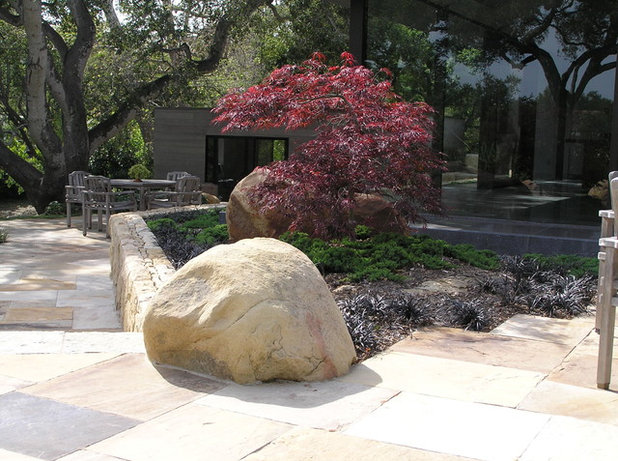
Charles McClure - Professional Site Planning
Isn't a boulder just a big rock? Well, it depends. The difference between a big rock and a boulder is, well, size. A boulder is generally a rock that is at least 10 inches across. It can be smooth or rugged, rounded or somewhat flat, but it's the size that sets it apart. Every geographic area has its native boulders, whether limestone, honeycomb, moss rock, black basalt or granite.
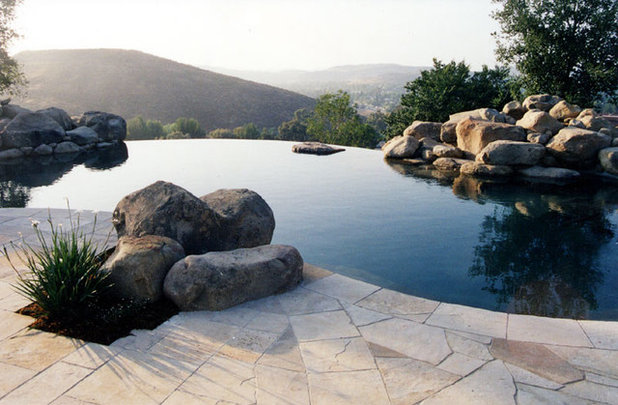 Practical Boulders Are Sold
Practical Boulders Are SoldMost boulders are sold at rock yards and landscape supply yards by the ton. You can go and pick out the boulders you want, and the rock yard staff will load them onto a pallet to weigh them.
Very dense boulders like granite will therefore likely cost more than same-size honeycomb boulders that have a lot of holes and weigh much less. The cost will vary widely depending upon the type of rock you get, but you can expect to pay anywhere from $100 to $200 per ton and up.
Most rock yards will deliver boulders to your home; inquire about the delivery fee and minimum purchases before you buy. Think through how you will get the boulders in place after they are delivered. Smaller boulders can be moved by one or two strong adults, while larger ones will require either a rock dolly or machinery like a front-end loader to move. Machinery can be rented by the day.
Finally, guard your back when moving these giant rocks in place. Wear gloves and bend your knees when picking up smaller ones, and try rolling larger ones into place to avoid back strain. When in doubt, use machinery or call in a friend or four to help out — there is nothing that dampens a good garden project like pulled and achy muscles.
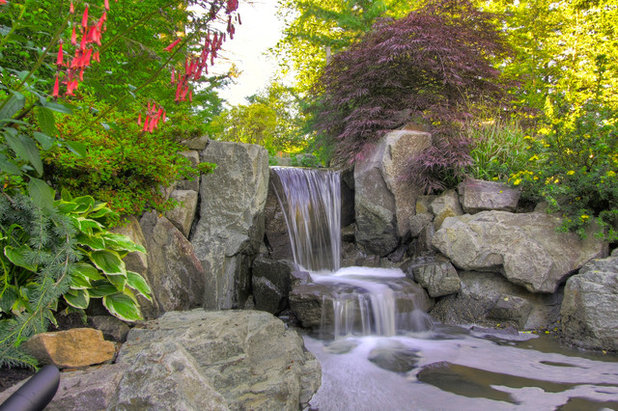
Paradise Restored Landscaping & Exterior Design
How to Use Boulders
Bordering water features.You can't beat the impact of boulders for water features that are intended to look very organic and natural. These rocks are often mortared around the edges of ponds as well as used to create waterfalls or rock walls on the edges of swimming pools.
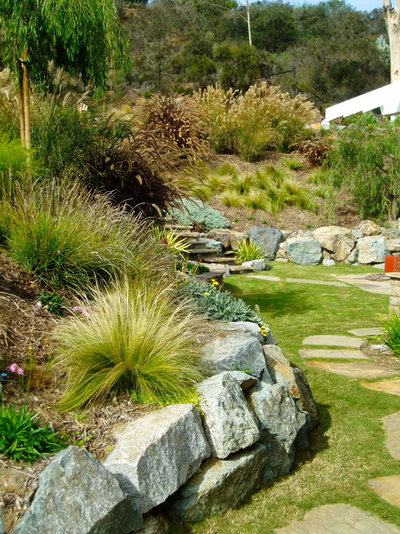
The Design Build Company
For retaining walls. When the ground is sloped or on an incline, called a grade change, large boulders can be moved into place to create different levels, or terraces. The soil is cut back to create a ledge or a flat surface, and boulders are settled in to hold the soil back.
Boulders can be mortared together or dry set, stacked or nestled without mortar. Many times it's the sheer weight of the boulder that keeps it in place.
When creating a retaining wall of any kind, remember to include weep holes, so moisture or rainwater can escape. You can do this by adding a smaller-diameter PVC pipe in between the rocks to act as a drain.
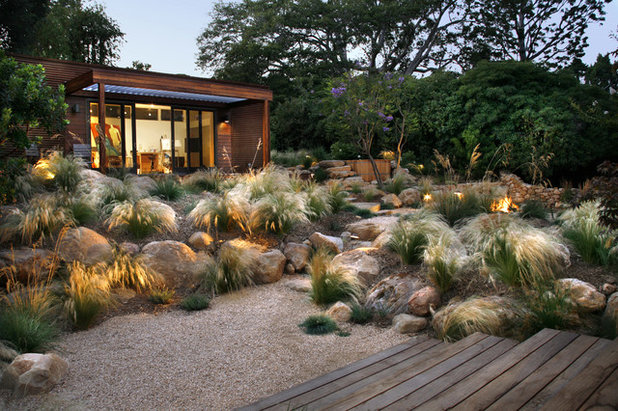
Margie Grace - Grace Design Associates
To control erosion. If you have a slope or grade change in your landscape but would prefer not to create terraces with retaining walls, boulders can be strategically added to keep soil in place. Large boulders are a creative option for keeping soil from eroding down a hillside, but it's important to nestle them into the soil to avoid any rolling.
Use natural plantings, like ornamental grasses and flowering perennials, around erosion-controlling boulders to create an organic look.
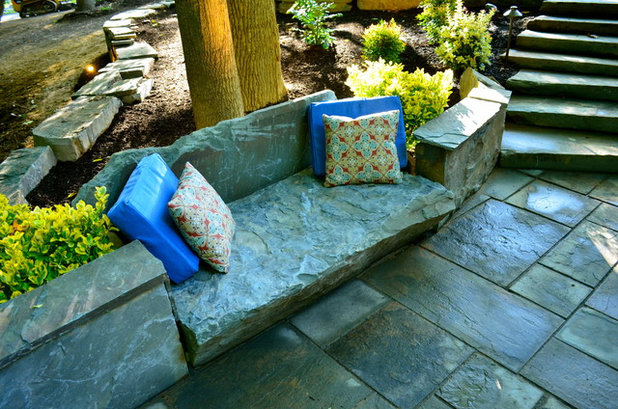
Finnerty, LLC
As garden seating. Flat-top boulders can be used for landscape seating in gathering areas. This works well bordering patios, around fire pits and in courtyards. Be careful if adding boulder seating in very hot and sunny areas, however, as the boulder surface will likely become too hot to sit on comfortably during summer months.
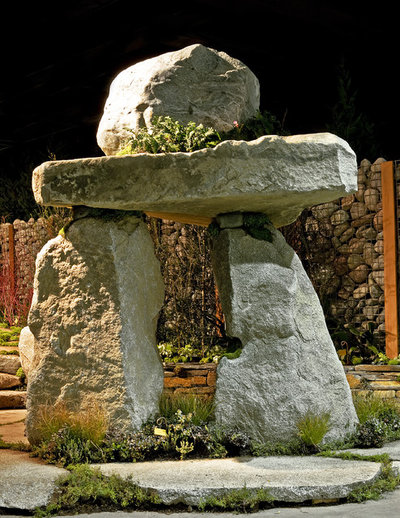
Exteriorscapes llc
For landscape accents. Even though boulders are obviously practical, there's no reason why they can't be added to your landscape for their sheer rugged beauty.
Build a patio around a giant one, add a grouping in your landscape bed or use a large, flat one for kids to scramble over and play on. Use boulders in artful ways as well — stack them to create a tower, make garden sculptures or add house numbers to a large one in your front yard.
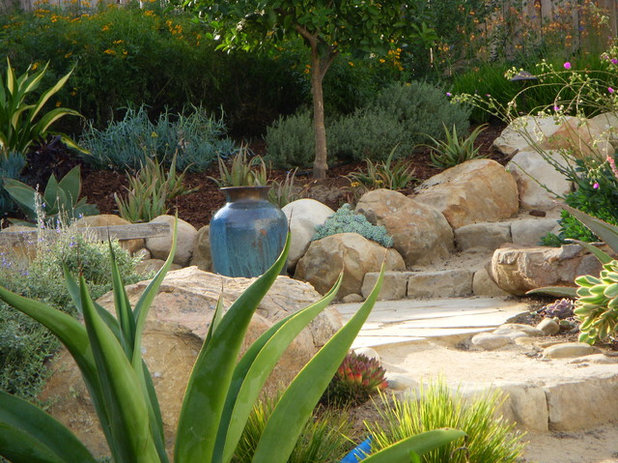
Pat Brodie Landscape Design
As a garden border. Most gardens have some type of edging that keeps soil and mulch inside the bed while keeping grass and other landscaping materials out. Smaller boulders can be used to define these beds in a very natural way; simply nestle them into the edges of the bed before planting and mulching.
Look for boulders that are around 1 to 2 feet in diameter and have a somewhat chunky appearance, then line them up end to end to set your beds apart in a bold and dramatic way.
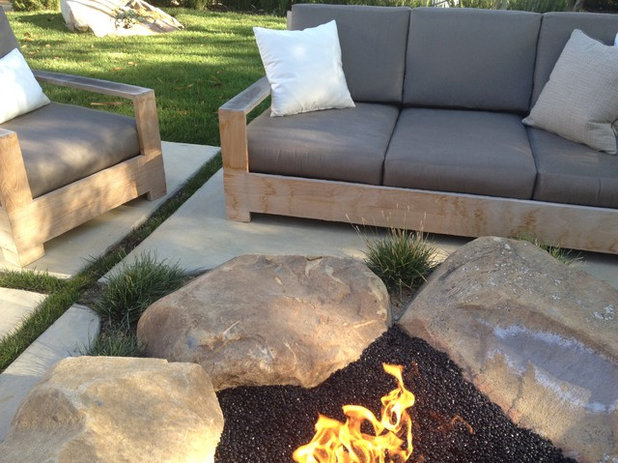
Jeffrey Gordon Smith Landscape Architecture
To create a fire pit. Boulder fire pits lend a very natural, bold look to an outside gathering space and can be quickly built with a few strong adults. Your local rock yard may be able to give you directions for creating a fire pit as well — just keep in mind that your aim is to create something that is durable and safe for a fire as well as that looks good.
More: Why your garden loves mulch





